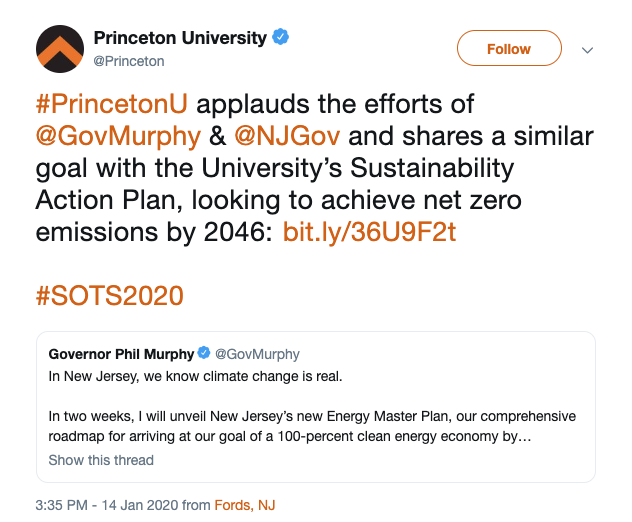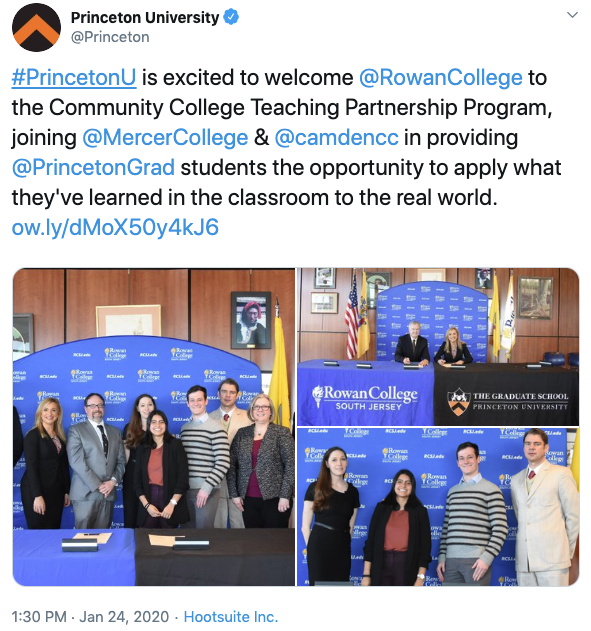



Princeton has updated its lists of University employee retirements to include those effective Jan. 1 and Feb. 1, 2020. https://www.princeton.edu/news/2020/01/23/employee-retirements-january-2020 Related from Princeton: Employee obituaries: January 2020 https://www.princeton.edu/news/2020/01/23/employee-obituaries-january-2020
“For a long time, I had this idea,” artist Mario Moore said. “I wanted to make black people like my dad visible and put them in positions of power. In America, we put people in certain hierarchies and usually don’t consider blue-collar workers to be on the same level as other people around campus. It became important to me to change that.” https://www.washingtonpost.com/lifestyle/2020/01/24/portraits-campus-lacked-diversity-so-this-artist-painted-blue-collar-workers-who-really-run-things/
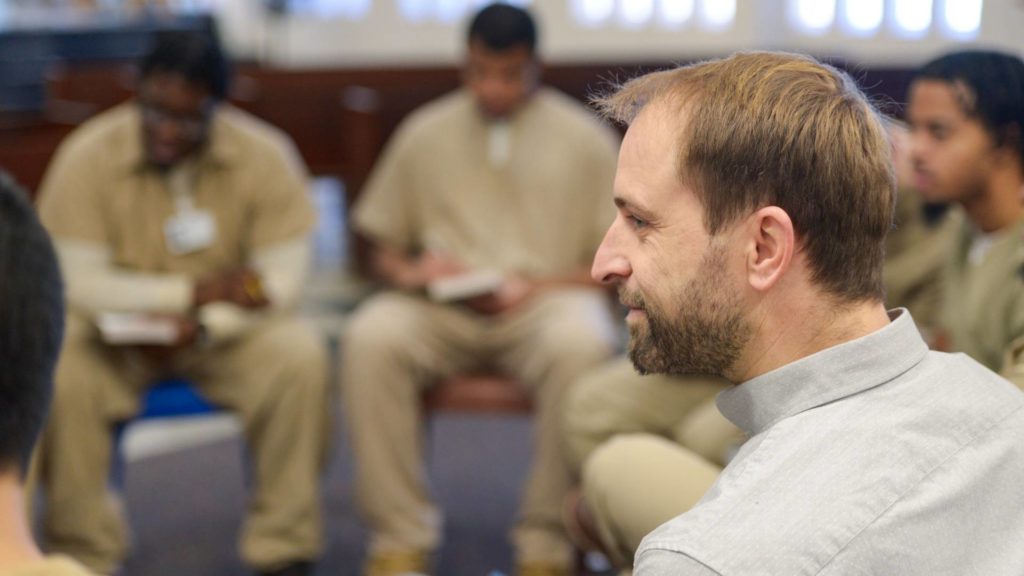
Mark Edwards, a lecturer in religion at Princeton, will teach the spring freshman seminar “Imprisoned Minds: Religion and Philosophy from Jail,” using writings from residents inside Garden State Youth Correctional Facility in Crosswicks, New Jersey, where he recently led a study group on the ethics and actions of Mahatma Gandhi. https://www.princeton.edu/news/2020/01/29/reading-gandhi-creating-ashram-youth-correctional-facility
A Princeton-led mission to study the interaction of the solar wind with the ancient cast-off winds of other stars, and the fundamental process of particle acceleration in space, has completed a critical NASA review and is now moving closer toward a scheduled launch in 2024. https://www.princeton.edu/news/2020/01/28/nasas-interstellar-mapping-and-acceleration-probe-mission-enters-design-phase
“We are pleased to have Peter Melchior be part of our center,” said Peter Ramadge, the CSML director. “He is not only doing important research in astrophysics, but his work shows that advanced machine learning methods are vital to pushing forward growth in the sciences. His work also fits with the collaborative and interdisciplinary nature of the center.” https://csml.princeton.edu/news/peter-melchior-newest-csml-faculty-uses-machine-learning-understand-cosmos
Scientists have modeled a key source of the turbulence found in a fusion experiment at the U.S. Department of Energy’s Princeton Plasma Physics Laboratory, paving the way for improving similar experiments to capture and control fusion energy. https://www.pppl.gov/news/2020/01/new-model-helps-pave-way-bringing-clean-fusion-energy-down-earth
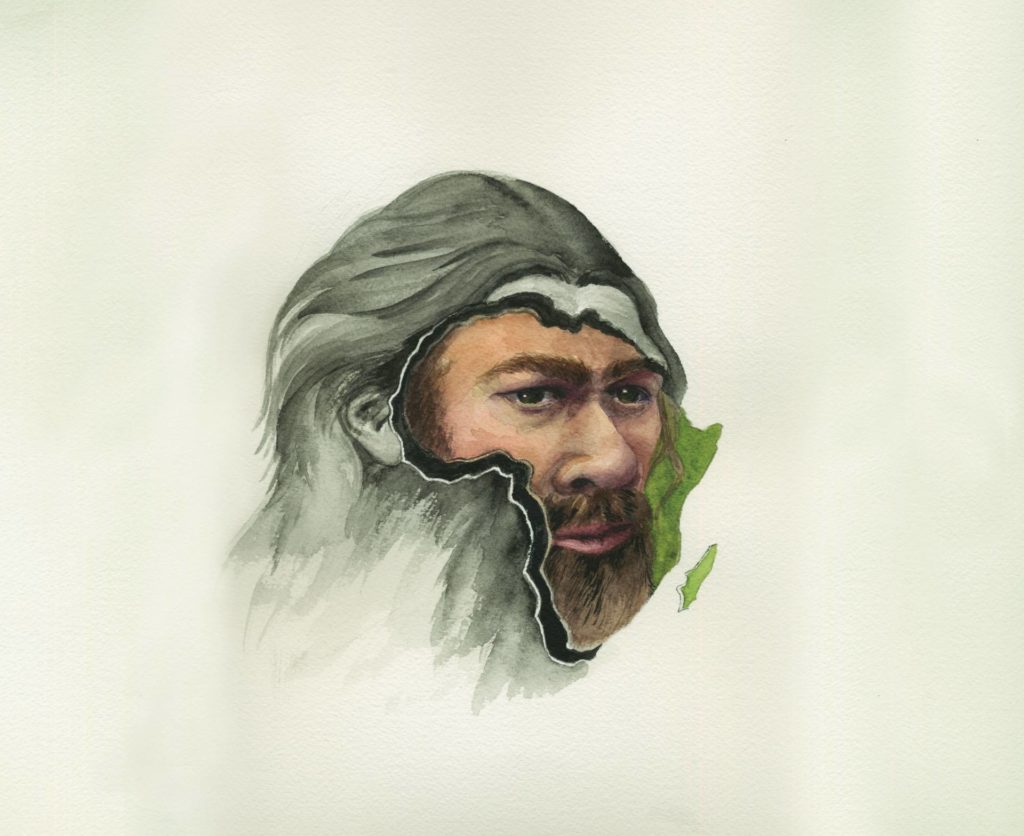
A team of Princeton researchers led by Joshua Akey has discovered that all modern humans carry some Neanderthal ancestry in their DNA — including Africans, which was not previously known. https://www.princeton.edu/node/219806
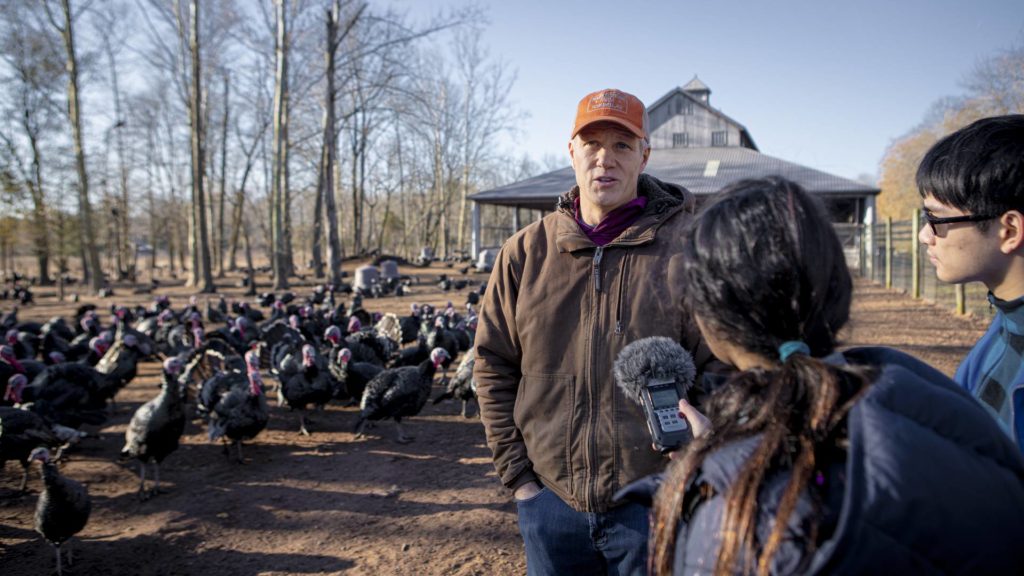
Students in several Princeton courses this fall examined the perils of climate change by considering how storytelling — with elements of description, language and structure — can influence people’s perceptions and fire up the imagination. https://www.princeton.edu/news/2020/01/27/creative-ecologies-storytelling-and-environmentalism
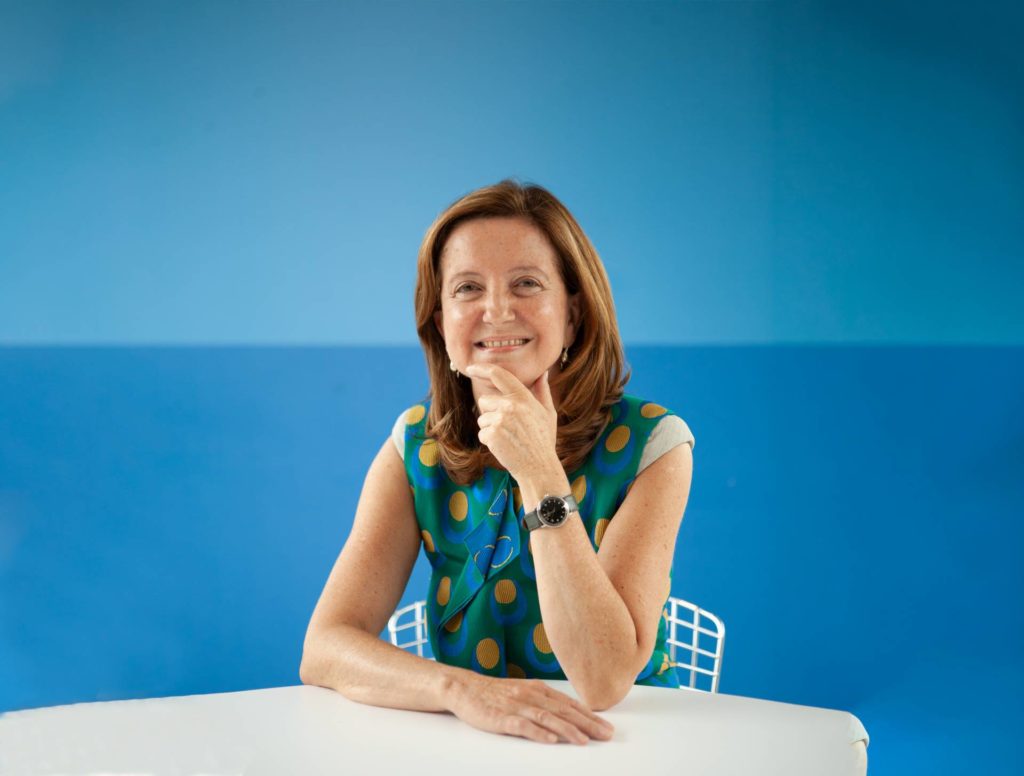
Princeton’s Beatriz Colomina has been awarded the 2020 Ada Louise Huxtable Prize for Contribution to Architecture from the W Awards. Manon Mollard, editor of The Architectural Review, said: “Beatriz Colomina’s rich and rigorous career has shaped the way we think about architecture, right back to [her collection of interdisciplinary essays] ‘Sexuality & Space’ — still a much-needed text in architectural education. Her writing, her curation and her teaching have been part of the backbone of architectural theory for many years, and will continue to inspire in years to come.” https://www.princeton.edu/news/2020/01/23/colomina-receives-ada-louise-huxtable-prize-contribution-architecture
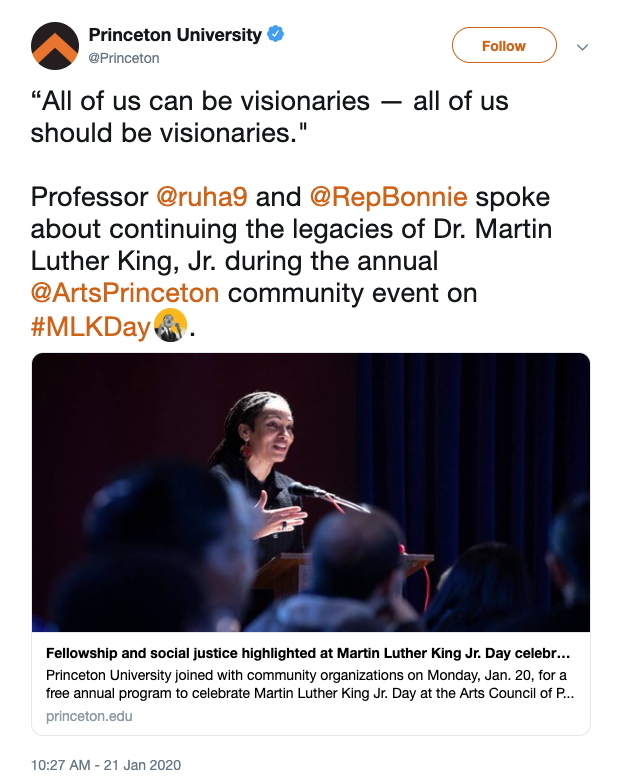
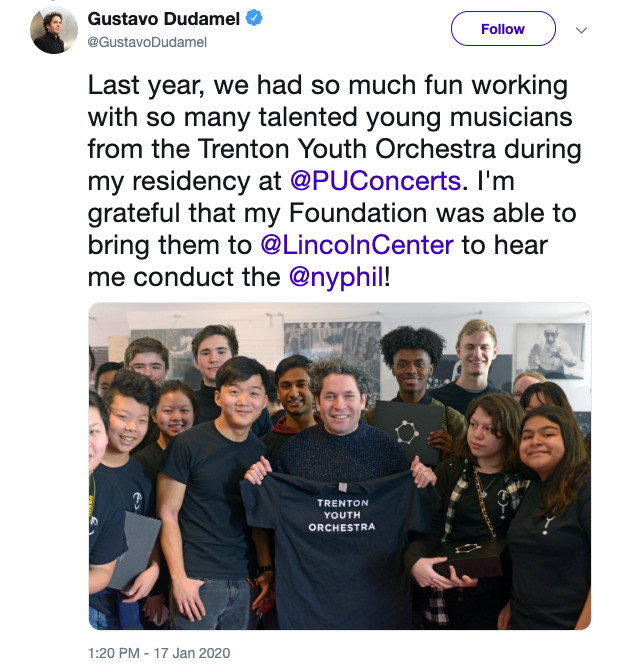
“As a result of his special accomplishments in neuroscience, multiple interests, extraordinary skills as a teacher and communicator, and contagious passion for science, Barry was able to develop and teach, for decades, one of the University’s most successful and popular courses, ‘The Brain: A User’s Guide’ — a course that brought the wonders of neuroscience to life for University students of all concentrations and interests,” Princeton’s Ronald Comer said.
https://www.princeton.edu/news/2020/01/22/barry-jacobs-renowned-neuroscientist-and-serotonin-researcher-dead-77
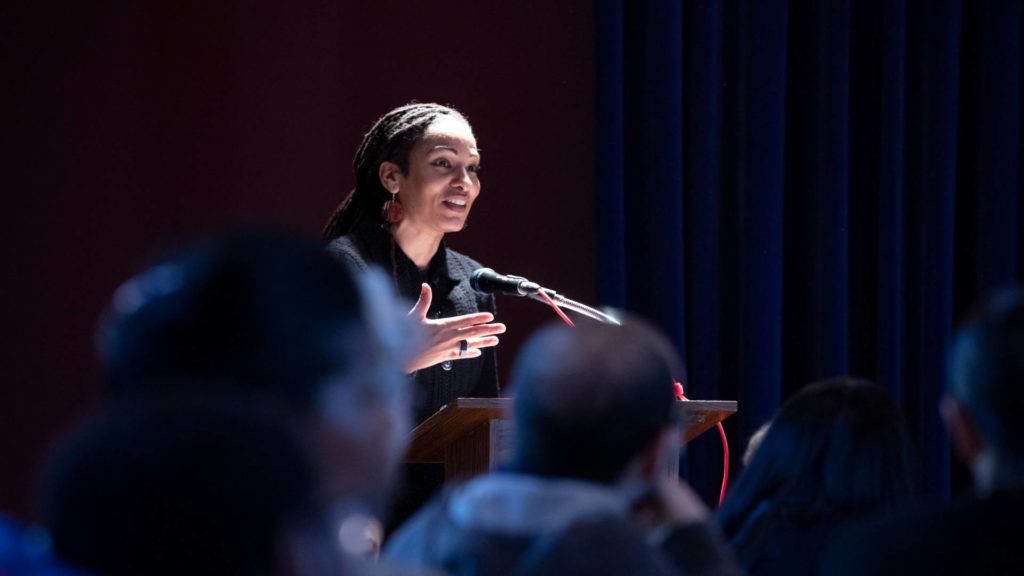
Princeton University joined with community organizations on Jan. 20 for the annual Martin Luther King Jr. Day celebration at the Arts Council of Princeton. U.S. Rep. Bonnie Watson Coleman of New Jersey’s 12th congressional district, who is the first African American woman to be elected to New Jersey’s congressional delegation, spoke at the event along with Princeton’s Ruha Benjamin.
“He was the first real Latin American historian and the first real Latin American scholar at Princeton,” said Princeton’s Jeremy Adelman. “He had a long and remarkable life, and he was intellectually engaged to the end.”
https://www.princeton.edu/news/2020/01/21/stanley-stein-inaugural-director-latin-american-studies-program-dies-99
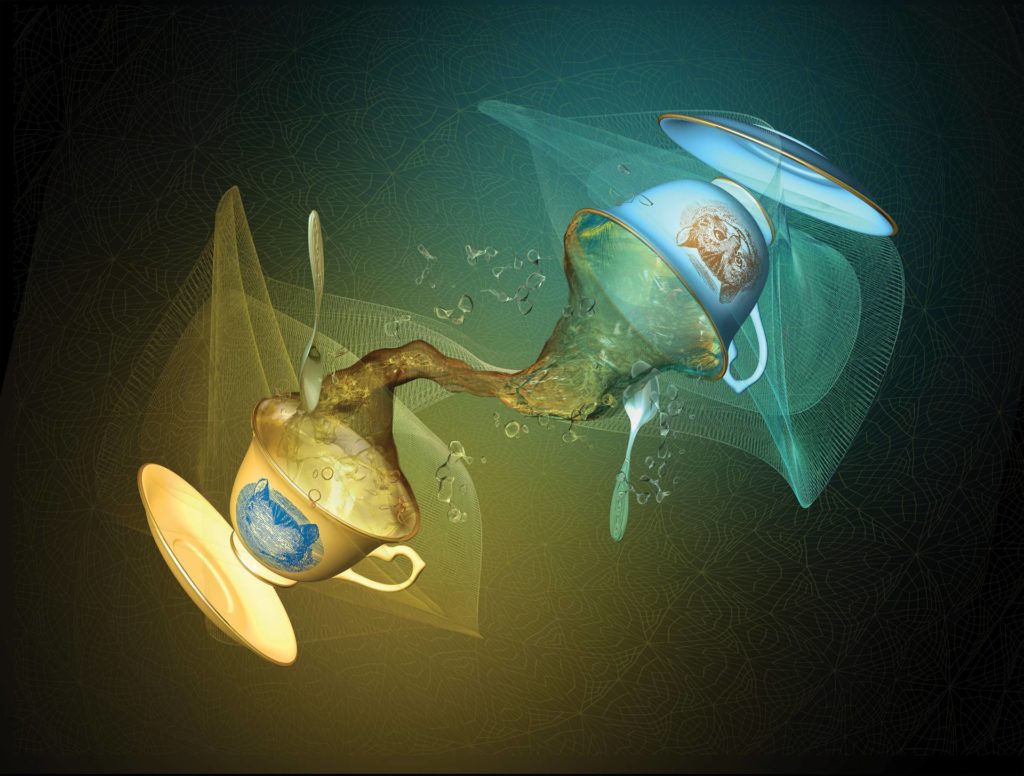
Researchers hope to use quantum principles to create an ultra-powerful computer that would solve problems that conventional computers cannot — from improving cybersecurity and modeling chemical reactions to formulating new drugs and making supply chains more efficient. This goal could revolutionize certain aspects of computing and open up a new world of technological possibilities. Researchers at Princeton are working to chart the future of quantum computing through foundational research in their labs and through collaborations with industry partners.
https://www.princeton.edu/news/2020/01/21/quantum-computing-opening-new-realms-possibilities
During Maxwell’s deanship at Princeton, Anthony Vidler, a professor at Cooper Union in New York City and professor of architecture at Princeton from 1965-93, said that Maxwell “established the school as a principal center of design research, history and theory.” His personal warmth and his love of the arts shaped his character in and out of the classroom: Vidler said he was a “friend to faculty and students alike, an accomplished watercolor painter, and celebrated for his exuberant after-dinner, impromptu piano recitals — ragtime, traditional jazz and music-hall songs were his specialty.” https://www.princeton.edu/news/2020/01/16/robert-maxwell-former-princeton-dean-architecture-humanist-perspective-dies-97
About 100 acres on Princeton’s campus meet high standards for improved surface water quality and reduced runoff. The University’s Sustainability Action Plan aims to expand enhanced stormwater management to 139 acres by 2026, and then 222 acres by 2046. In this video, Associate University Architect for Planning Natalie Shivers discusses the importance of managing stormwater, and how the University plans to hit its targets. https://www.princeton.edu/news/2020/01/16/sustainability-action-plan-increases-stormwater-management-efforts-improved-water
Ben Chang, the University’s Deputy Vice President of Communications, is a strait-laced statesman. He’s also a DJ and a photographer. He’s a spokesperson for one of the nation’s oldest, most elite institutions. He’s also a first-generation American who sees himself as aiding and representing those whom the establishment leaves behind.
Ben Chang said: “For years and years, I thought of Princeton and other schools in a sort of word-cloud. You wouldn’t think ‘first-generation.’ You wouldn’t think ‘a leader in financial aid and opportunity.’ You wouldn’t think ‘trying to drive a conversation nationwide about access and opportunity.’ What I realized coming into Princeton was that there was this great sense of opportunity and innovation — things unexpected to talk about at Princeton — but also, a challenge. There’s a perception gap to close. As a communicator, that’s exciting.”
